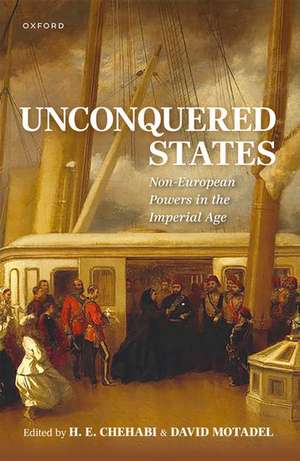Unconquered States: Non-European Powers in the Imperial Age
Editat de H. E. Chehabi, David Motadelen Limba Engleză Hardback – 30 dec 2024
Preț: 862.79 lei
Preț vechi: 1230.78 lei
-30% Nou
Puncte Express: 1294
Preț estimativ în valută:
165.11€ • 179.29$ • 138.70£
165.11€ • 179.29$ • 138.70£
Carte disponibilă
Livrare economică 22-28 martie
Preluare comenzi: 021 569.72.76
Specificații
ISBN-13: 9780198863298
ISBN-10: 0198863292
Pagini: 608
Ilustrații: 36 black-and-white figures
Dimensiuni: 160 x 240 x 40 mm
Greutate: 0 kg
Editura: OUP OXFORD
Colecția OUP Oxford
Locul publicării:Oxford, United Kingdom
ISBN-10: 0198863292
Pagini: 608
Ilustrații: 36 black-and-white figures
Dimensiuni: 160 x 240 x 40 mm
Greutate: 0 kg
Editura: OUP OXFORD
Colecția OUP Oxford
Locul publicării:Oxford, United Kingdom
Recenzii
This is an ingenious collection, a book on international history in the 19th and 20th centuries that really does, for once, "fill a gap". By countering our simple assumption that the West's imperial and colonial drives swallowed up all of Africa and Asia in the post-1850 period, Chehabi and Motadel's fine collection of case-studies of nations that managed to stay free—from Abyssinia to Siam, Japan to Persia—gives us a more rounded and complex view of the international Great-Power scene in those decades. This is really fine revisionist history.
This is an excellent collection of scholars writing on an important set of states, which deserve to be considered together.
Carefully curated and with an excellent introduction that provides an analytical frame, this book offers a global history of "unconquered" countries in the imperial age that is original in its perspective and composition.
The book offers an insightful comparative analysis of political forms and relationships in non-European countries from the 18th to the early 20th centuries. The "non-conquered states" of Asia and Africa are show as sometimes resisting and but often accommodating in innovative ways European political forms and military and diplomatic techniques. The particular appeal of the essays lies in their effort to bring to the surface and critically assess the indigenous histories and struggles that enabled these political formations, each in their own way, to respond to the challenges of modernization. This is global history at its kaleidoscopic best.
This is an excellent collection of scholars writing on an important set of states, which deserve to be considered together.
Carefully curated and with an excellent introduction that provides an analytical frame, this book offers a global history of "unconquered" countries in the imperial age that is original in its perspective and composition.
The book offers an insightful comparative analysis of political forms and relationships in non-European countries from the 18th to the early 20th centuries. The "non-conquered states" of Asia and Africa are show as sometimes resisting and but often accommodating in innovative ways European political forms and military and diplomatic techniques. The particular appeal of the essays lies in their effort to bring to the surface and critically assess the indigenous histories and struggles that enabled these political formations, each in their own way, to respond to the challenges of modernization. This is global history at its kaleidoscopic best.
Notă biografică
H. E. Chehabi is Professor of International Relations and History Emeritus, Boston University, and Honorary Professor, School of History, University of St. Andrews. He studied geography and history at the University of Caen and international relations at Science Po before going to Yale University, where he received his PhD in political science. He has taught at Harvard University, UCLA, and Boston University. He has held a Humboldt Fellowship as well as fellowships at St. Antony's College, Oxford, and the Woodrow Wilson Center in Washington, DC.David Motadel is Associate Professor of International History at the London School of Economics and Political Science (LSE). A graduate of Cambridge, where he was a Gates Scholar, he has held visiting positions at Harvard, Yale, Oxford, Sciences Po, and the Sorbonne. He is the author of a book on the history of Muslims under German rule in the Second World War (Harvard University Press, 2014), which was awarded the Ernst Fraenkel Prize, and the editor of a volume on Islam and the European Empires (Oxford University Press, 2014). In 2018, he received the Philip Leverhulme Prize for History.
